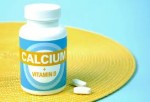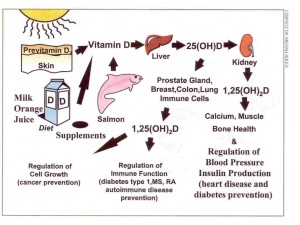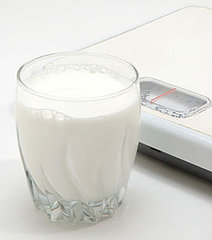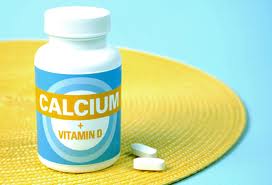 If a bone density scan has placed you at risk for osteoporosis, you might want to think twice before starting a bone-building medication as a first course of action. Changing your diet to include more calcium and vitamin D is an effective and less risky strategy that doctors often disregard, according to a recent University of Illinois study published in the journal Nutrients.
If a bone density scan has placed you at risk for osteoporosis, you might want to think twice before starting a bone-building medication as a first course of action. Changing your diet to include more calcium and vitamin D is an effective and less risky strategy that doctors often disregard, according to a recent University of Illinois study published in the journal Nutrients.
Many doctors are quick to prescribe bone-building medication because they believe it's unlikely that people will change their diets, said study co-author Karen Chapman-Novakofski, professor of nutrition at University of Illinois. But these medications have risks, which ironically include an increase in hip fractures and jaw necrosis, and therefore should be used as a last resort when diet and supplements don’t help, she said.
In the study, which analyzed 219 articles in scientific journals, the researchers found that adults who increase their intake of vitamin D and calcium, whether through food or supplements, usually increase their bone mineral density and reduce their risk for hip fracture significantly.
The National Osteoporosis Foundation recommends that adults age 50 and older get a total of 1,200 mg of calcium and 800-1,000 international units (IUs) of vitamin D every day. Karen Plawecki, lead author of the study, said it is possible to consume the recommended calcium without gaining weight. Three glasses of 1 percent or skim milk contain 900 mg of calcium, and many other foods, like soy milk, orange juice, cereal and bread, are often fortified with calcium and vitamin D.
The researchers also noted that following a low-sodium diet seems to have a positive effect on bone density. Click the National Osteoporosis Foundation links below for tips on getting enough calcium and vitamin D.
http://www.nof.org/aboutosteoporosis/prevention/calcium
http://www.nof.org/aboutosteoporosis/prevention/vitamind

 Due to the growing interest in Vitamin D, we featured that fat soluble vitamin in our August e-newsletter which can viewed by clicking
Due to the growing interest in Vitamin D, we featured that fat soluble vitamin in our August e-newsletter which can viewed by clicking  Overweight women with low Vitamin D levels who lose more than 15% of their body weight experience a significant increase in levels of this nutrient, according to a new study by researchers at Fred Hutchinson Cancer Center. "Since vitamin D is generally lower in persons with obesity, it is possible that low vitamin D could account, in part, for the link between obesity and diseases such as cancer, heart disease and diabetes," said Caitlin Mason, PhD, lead author of the study published in the
Overweight women with low Vitamin D levels who lose more than 15% of their body weight experience a significant increase in levels of this nutrient, according to a new study by researchers at Fred Hutchinson Cancer Center. "Since vitamin D is generally lower in persons with obesity, it is possible that low vitamin D could account, in part, for the link between obesity and diseases such as cancer, heart disease and diabetes," said Caitlin Mason, PhD, lead author of the study published in the  If a bone density scan has placed you at risk for osteoporosis, you might want to think twice before starting a bone-building medication as a first course of action. Changing your diet to include more calcium and vitamin D is an effective and less risky strategy that doctors often disregard, according to a recent University of Illinois
If a bone density scan has placed you at risk for osteoporosis, you might want to think twice before starting a bone-building medication as a first course of action. Changing your diet to include more calcium and vitamin D is an effective and less risky strategy that doctors often disregard, according to a recent University of Illinois  Calcium and Vitamin D are essential nutrients known for their role in bone health. However, a lot of vitamin companies have been touting these two substances for all kinds of health benefits beyond the skeletal system. This has created some confusion about nutritional messaging.
Calcium and Vitamin D are essential nutrients known for their role in bone health. However, a lot of vitamin companies have been touting these two substances for all kinds of health benefits beyond the skeletal system. This has created some confusion about nutritional messaging.